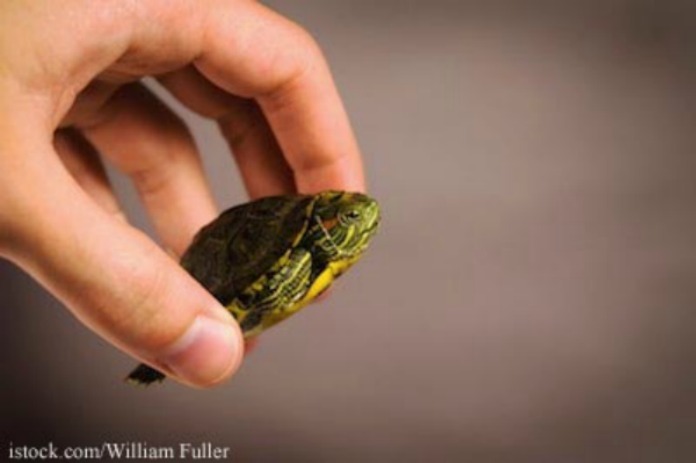 Salmonella outbreaks linked to tiny pet turtles have expanded, according to the Centers for Disease Control and Prevention (CDC). In October 2015, the CDC reported two Salmonella outbreaks linked to tiny turtles that had sickened a total of 51 people. There are now four outbreaks that have sickened a total of 133 people in 26 states between January 16, 2015 and April 8, 2016. Thirty eight people have been hospitalized. Most of of those sickened are children.
Salmonella outbreaks linked to tiny pet turtles have expanded, according to the Centers for Disease Control and Prevention (CDC). In October 2015, the CDC reported two Salmonella outbreaks linked to tiny turtles that had sickened a total of 51 people. There are now four outbreaks that have sickened a total of 133 people in 26 states between January 16, 2015 and April 8, 2016. Thirty eight people have been hospitalized. Most of of those sickened are children.
Because small turtles have long been associated with Salmonella infections, especially in children, the sale of turtles with shells of less than four inches in length has been banned since 197. Many of the case patients in this outbreak reported buying the small turtles from street vendors.
Public health investigators used the PulseNet system, a national subtyping network of laboratories, to identify illnesses that may be part of these outbreaks. They identified four outbreaks, each associated with a different strain of Salmonella, one of which is antibiotic resistant.
One hundred and ten of those sickened were interviewed by public health officials. Half of them reported contact with small turtles or their environments, such as water from a turtle habitat, before they became ill.
Twenty-five of those interviewed reported purchasing a turtle from a street vendor or receiving a turtle as a gift. One turtle was purchased at a flea market from a vendor who obtained the turtles from Tangi Turtle Farm in Louisiana.
The CDC summarized each of the outbreaks.
Outbreak 1 and Outbreak two were initially reported in October. At that time Outbreak 1 included 11 case patients and Outbreak 2 included 50. Now, Outbreak 1 includes 17 cases and Outbreak 2 includes 70.
For Outbreak 1, the strain is Salmonella Sandiego. The 17 illnesses reported from nine states were as follows: California (6), Florida (1), Illinois (3), Mississippi (1), Oklahoma (1), Pennsylvania (1), South Carolina (1), Texas (2), and Vermont (1).
Onset of illness was reported from January 16, 2015 through November 22, 2015. Fifteen of the case patients, who ranged in age from younger than 1 year to 77 years, were hospitalized. No deaths were reported.
Outbreak 2 had two strains Salmonella Poona and Salmonella IIIb 61:i:z53. Seventy cases were reported from 21 states: Alabama (1), Arizona (1), California (26), Connecticut (1), Florida (1), Illinois (3), Indiana (1), Kansas (1), Louisiana (1), Missouri (1), Nevada (2), New Jersey (2), North Carolina (2), New York City (7), Ohio (1), Oregon (1), Pennsylvania (3), South Carolina (4), Tennessee (1), Texas (9), and Virginia (1).
Onset of illnesses ranged from April 7, 2015 and April 8, 2016. Twenty one of the case patients, who ranged in age from younger than 1 year to 96 years, were hospitalized.
Outbreak 3 sickened 21 people with the strain Salmonella Sandiego. The cases were reported in seven states: Arizona (2), California (9), New Jersey (1), New Mexico (4), Oregon (2), Texas (2), and Washington (1).
Onset of illness dates ranged from February 8, 2015 to October 25, 2015. Five of the case patients, who ranged in age from younger than 1 year to 65 years, were hospitalized. No deaths were reported.
Outbreak 4 included 25 people from six states infected with a different outbreak strain of Salmonella Poona. Cases, reported between February 11, 2015 and November 14, 2015, were from the following states: Arizona (2), California (10), Nevada (2), New York City (1), Ohio (1), and Texas (9).
This is not the first time a multistate outbreak has been linked to illegal pet turtles. An outbreak in 2013 sickened 371 people in 40 states. And an outbreak in 2012 sickened 248 people in 34 states.
Turtles of any size can carry Salmonella. Owners of legally sized pet turtles should take care to wash hands with soap and water immediately after handling them or touching anything in the area where they live or roam. The CDC has compiled an infographic about safely keeping a pet turtle.
Anyone who has a turtle and has suffered the symptoms of a Salmonella infection, including fever, chills, muscle aches, headache, abdominal cramps, nausea, vomiting, and diarrhea that may be bloody, should see a doctor. Those most at risk are children, seniors, and those with compromised immune systems.




